Substrate phosphorylation - Study guides, Revision notes & Summaries
Looking for the best study guides, study notes and summaries about Substrate phosphorylation? On this page you'll find 1471 study documents about Substrate phosphorylation.
Page 4 out of 1.471 results
Sort by
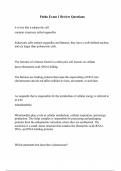
-
Patho Exam 1 Review Questions
- Exam (elaborations) • 55 pages • 2024
-
- £10.67
- + learn more
it is true that a eukaryotic cell. contains structures called organelles Eukaryotic cells contain organelles and histones, they have a well-defined nucleus, and are larger than prokaryotic cells. The function of a histone found in a eukaryotic cell focuses on cellular deoxyribonucleic acid (DNA) folding The histones are binding proteins that cause the supercoiling of DNA into chromosomes and do not affect cellular division, movement, or activities. An organelle that is responsible for th...
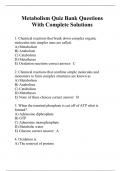
-
Metabolism Quiz Bank Questions With Complete Solutions
- Exam (elaborations) • 19 pages • 2023
- Available in package deal
-
- £10.66
- + learn more
1. Chemical reactions that break down complex organic molecules into simpler ones are called: A) Metabolism B) Anabolism C) Catabolism D) Metatheses E) Oxidation reactions correct answer: C 2. Chemical reactions that combine simple molecules and monomers to form complex structures are known as A) Metabolism B) Anabolism C) Catabolism D) Metatheses E) None of these choices correct answer: B 3. When the terminal phosphate is cut off of ATP what is formed? A) Adenosine diphosphat...
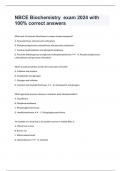
-
NBCE Biochemistry exam 2024 with 100% correct answers
- Exam (elaborations) • 30 pages • 2024
- Available in package deal
-
- £13.53
- + learn more
Which pair of enzymes listed below is unique to gluconeogensis? A. Pyruvate kinase and pyruvate carboxylase B. Phosphoenolpyruvate carboxykinase and pyruvate carboxylase C. Fructose bisphosphatase and phosphofructokinase D. Pyruvate dehydrogenase and glucose 6-phosphataseAnswer - B. Phosphoenolpyruvate carboxykinase and pyruvate carboxylase Which 2 polysaccharides contain the same types of bonds? A. Cellulose and amylose B. Amylopectin and glycogen C. Glycogen and cellulose D. Amylo...

-
BIOD 171/ 171 PORTAGE LEARNING (2 VERSIONS) FINAL EXAM WITH VERIFIED QUESTIONS AND ANSWERS
- Exam (elaborations) • 52 pages • 2024
- Available in package deal
-
- £25.43
- + learn more
BIOD 171/ 171 PORTAGE LEARNING (2 VERSIONS) FINAL EXAM WITH VERIFIED QUESTIONS AND ANSWERS VERSION 1 • Define catabolism. It is a process that allows larger molecules to be broken down into useful energy sources. • Upon cellular injury, which metabolic process is involved during the growth and repair phases of the cell? The anabolic process because it is involved with building up small complexes into larger complexes. • True or False: Metabolism is a controlled set of biochemi...
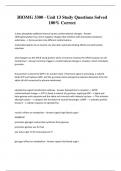
-
BIOMG 3300 - Unit 13 Study Questions Solved 100% Correct
- Exam (elaborations) • 11 pages • 2024
-
- £10.00
- + learn more
2 ways phosphate addition/removal causes conformational changes - Answer 1)Phosphorylation has a lot of negative charges that interfere with interactions between substrates --> forces protein into different conformations 2) phosphorylation of an enzyme can also alter substrate-binding affinity via electrostatic repulsion what happens to the GPCR and g-protein when a hormone reaches the GPCR receptor on cell membrane? - Answer hormone triggers a conformational change in receptor, which s...
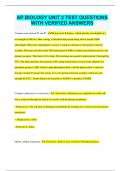
-
AP BIOLOGY UNIT 2 TEST QUESTIONS WITH VERIFIED ANSWERS
- Exam (elaborations) • 18 pages • 2024
- Available in package deal
-
- £8.20
- + learn more
AP BIOLOGY UNIT 2 TEST QUESTIONS WITH VERIFIED ANSWERS Compare and contrast P2 and P1. Photosystem II begins , which absorbs wavelengths at a wavelength of 680 nm. Here, energy is absorbed and passed along until it reaches P680 chlorophyll. When this chlorophyll is excited, it sends its electrons to the primary electron acceptor. Electrons are taken from H2O and passed to P680 to replace the electrons given to the primary acceptor. This forces O2 to form. The electrons are passed to ph...
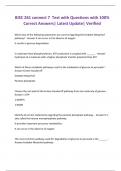
-
BISC 261 connect 7 Test with Questions with 100% Correct Answers| Latest Update| Verified
- Exam (elaborations) • 13 pages • 2024
-
- £10.66
- + learn more
Which two of the following statements are correct regarding the Embden-Meyerhof pathway? - Answer It can occur in the absence of oxygen It results in glucose degredation In substrate-level phosphorylation, ATP production is coupled with ______. - Answer hydrolysis of a molecule with a higher phosphate transfer potential than ATP
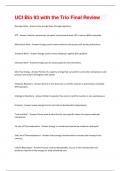
-
UCI Bio 93 with the Trio Final Review Questions With 100% Correct Solutions.
- Exam (elaborations) • 23 pages • 2024
- Available in package deal
-
- £6.56
- + learn more
Bioengernetics - Answer-How energy flows through organisms. ATP - Answer-Used for mechanical, transport, and chemical work. ATP is also an RNA nucleotide. Mechanical Work - Answer-Energy used in motor proteins and muscle cells during contractions. Transport Work - Answer-Energy used to move substances against their gradient. Chemical Work - Answer-Energy used to convey polymers into monomers. Gibs Free Energy - Answer-Portion of a systems energy that can preform work when temperature and p...
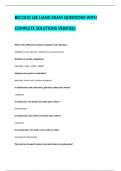
-
BSC1010 LEE LIANG EXAM QUESTIONS WITH COMPLETE SOLUTIONS VERIFIED.
- Exam (elaborations) • 11 pages • 2024
- Available in package deal
-
- £9.10
- + learn more
BSC1010 LEE LIANG EXAM QUESTIONS WITH COMPLETE SOLUTIONS VERIFIED. What is the difference between oxidation and reduction? oxidation is lose electron, reduction is receive electron Reaction of aerobic respiration? C6H12O6 + 6O2 = 6CO2 + 38ATP Sequence of events in respiration? glycolysis, krebs cycle, electron transport In prokaryotes and eukaryotes, glycolysis takes place where? cytoplasm In eukaryotes, the krebs cycle takes place where ? mitochondria In prokaryotes, the krebs cycl...
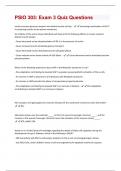
-
PSIO 303: Exam 3 Quiz Questions and Answers well Explained Latest 2024/2025 Update 100% Correct.
- Exam (elaborations) • 16 pages • 2024
- Available in package deal
-
- £6.56
- + learn more
Insulin increases glucose transport into skeletal muscle cells by: - Increasing translocation of GLUT- 4-containing vesicles to the plasma membrane An inhibitor of the serine kinase GSK-3beta will have all of the following effects on insulin-resistant skeletal muscle except: - Cause decreased serine phosphorylation of IRS-1 in the presence of insulin. - Cause increased insulin-stimulated glucose transport. - Cause decreased insulin-stimulated tyrosine phosphorylation. - Cause reduced seri...

That summary you just bought made someone very happy. Also get paid weekly? Sell your revision notes on Stuvia! Discover all about earning on Stuvia


